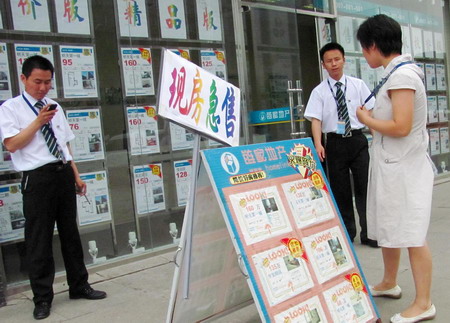-
News >Bizchina
Policies turn on the heat for real estate agencies
2010-08-16 10:18
Employees of a real estate agency loitering outside their office in Beijing as property sales slow down. House prices in China's 70 major cities grew 10.3 percent year-on-year in July, the slowest growth pace since February this year. [Nan Shan / For China Daily]
Building a career in property has its pitfalls, say experts
BEIJING - It's a searingly hot, sticky afternoon in Beijing's Changping district and several real estate agents in cheap business suits are lolling about on old plastic chairs in front of their office in Tiantongyuan, the largest residential community in Asia with a population of some 300,000.
Despite the mercury approaching 40 C, the air conditioners and half of the company's computers are shut down to save electricity. Posters of properties for sale are fading, rendering their wording hard to read.
Huang Meiqing, a 24-year-old real estate agent from Jiangxi province, is exhausted by the sheer inactivity the agency has endured for several weeks. She has a heat rash on her neck and back and no appetite for her lunch of egg pancake.
The lack of business followed the implementation of government policies designed to cool the over-heated property market earlier this year.
"Six colleagues quit the job in the past four months and now only five remain. In 2008, our agency employed about 25 people," Huang said. "I used to be a star agent and sold as many as seven apartments within a month. I didn't think much of earning 100,000 yuan ($146,98) a year in the past."
With an air of despair in her voice, she added: "For the past two months I have been obliged to write zeros on my performance records. It means I only get the basic wage of 1,000 yuan a month. I only finished middle-school education and it is very hard for me to find another job with such low entrance requirements in the capital."
According to the National Bureau of Statistics, housing prices in the nation's 70 major cities grew 10.3 percent year-on-year last month, the slowest growth pace since February this year.
The number of property sales in Shanghai, Nanjing and Hangzhou halved in the first six months of the year, while those in Beijing dropped 40 percent, according to statistics from the policy research center under the Ministry of Housing and Urban-Rural Development and China Index Academy.
The figures have drawn a question mark over the future for Huang Meiqing, and many other employees who are working in China's real estate industry.
A recent report published by Career International Consulting Ltd showed that after the government's policies came into effect, Chinese property agencies and property sales companies witnessed a 20 percent turnover in employees in the past few months.
The report is based on a survey of 327 Chinese property developers, real estate agencies, property sales companies, property management companies and other related commercial enterprises.Chen Xiaoman, business development manager at Career International, said: "After the new regulations were implemented, we saw that most pressure on employment in the property sector was exerted on real estate agents and sales people, since the entrance requirements are relatively low.
"Those employees have poorer education and less experience in the workplace. As a result they are more vulnerable to any external impact on the market."
During the prosperous years of China's real estate market, a great number of job hunters with limited education and abilities swarmed into the sector. However, when the future of the market became increasingly gloomy owing to the uncertainty of sales and prices, a huge number of them forced to quit, Chen said.
However, the property development sector, the core group of the real estate market, only saw 10 percent employee turnover because the entrance requirements for such enterprises are relatively higher, according to the report.
The survey also revealed the highest staff turnover occurred in accounting, human resources and marketing, with a figure estimated at about 15 percent. That number was only 2 percent among high-level management staff working in innovation and development, engineering, investment and cost control.
Ellen Yang, a manager specializing in the property and construction sector at Career International, said that although house sales are still flat, the property developers are not cutting back on building new projects. Many companies have adopted new strategies by adjusting their business focus from residential projects to commercial projects. "That doesn't lead to large job-cutting or salary decreases," said Yang.
